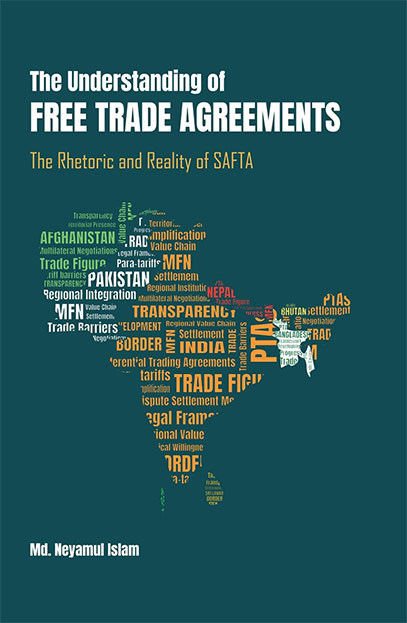- Shop
- Academic & Non-fiction
- The Understanding of Free Trade Agreements: The Rhetoric and Reality of SAFTA
The Understanding of Free Trade Agreements: The Rhetoric and Reality of SAFTA
https://uplbooks.com/shop/9789845063821-the-understanding-of-free-trade-agreements-the-rhetoric-and-reality-of-safta-11899 https://uplbooks.com/web/image/product.template/11899/image_1920?unique=56f7a2e
| Language: English |
Tags :
Book Info
The South Asian countries, being one of the least integrated regions, are experiencing immense and unprecedented growth in trade and commerce in recent times. Political dynamics and bureaucratic complexities significantly hindered effective integration as most of these countries have a turbulent political history. However, the countries have implemented various bilateral and intra-regional treaties to promote regional integration and prosperity within this region. These treaties aim to enhance regional cooperation by eradicating trade barriers. This book delves into an objective assessment of the SAFTA from fresh perspectives. For that, the author explored various provisions of NAFTA and GATT. The author firmly believes that the SAARC may play an instrumental role in ensuring an effective South Asian intra-trade system. The book also recommends various methods for South Asian integration to simplify the trade rules, increase transparency, promote intra-trade dialogue between states, establish South Asian Dispute Resolution Tribunal, bilateral and plurilateral FTAs and more. Contents Chapter 1: Introduction to Legal and Institutional Context of Free Trade Chapter 2: SAFTA and Its Compatibility with WTO Rules on FTA Chapter 3: SAARC: Its Agenda, Expansion and Impending Challenges in Promoting Regional Cooperation 35 Chapter 4: SAFTA: Genesis and Its Dreams Chapter 5: South Asian Free Trade in Service (SATIS) Chapter 6: South Asian Transit and Border Trade: A Comprehensive Portrait of Transit of Goods Chapter 7: Current Trends of South Asian Trade The Understanding of Free Trade Agreements Chapter 8: SAFTA Gaps and Realizations Chapter 9: Recommendations and Future Options for South Asian Free Trade

Md. Neyamul Islam
Md. Neyamul Islam is the First Secretary (Customs & VAT) at Bangladesh’s National Board of Revenue. He received his undergraduate and postgraduate degrees in Business Studies from the University of Dhaka. His other credentials include an LLB from the University of London, LLM from the University of Hawaii and a PhD in International Trade Law from the University of Kansas School of Law, USA. He has more than fifteen years of successful experience with both inter-government and public institutions related to trade facilitation, rules, and best practices, including work with the World Customs Organization, the National Board of Revenue Bangladesh, the Custom House Dhaka, ICD, Chattogram, Benapole and the Office of the Attorney General for Bangladesh. He has been



